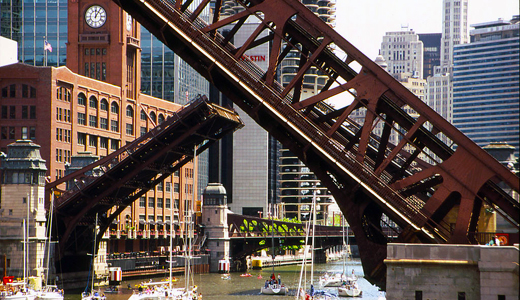
Chicago’s bridges in the summertime
PHOTO: Tripp via Flickr + Wikimedia Commons
Our last issue began in Los Angeles where we got away from the winter cold and celebrated an Oscar win by a haunting black-and-white Polish film. This time, the weather is perfect for a visit to Chicago, a city blessed with a spectacular waterfront and dazzling architecture.
We focus on the 100-year-old Chopin Theater, a performance center with great karma, as Chicago Tribune theater critic Chris Jones put it. Chicago writer Megan Geigner takes us to Wicker Park for a historical glimpse of the area once called the Polish Triangle where 2 million Polish immigrants began their American life, and introduces us to the Chopin’s dynamic directors, Zygmunt Dyrkacz and Lela Headd Dyrkacz, and their cultural gem. Intellectually and visually stimulating, controversial, often anti-establishment and anti-war, but always celebrating its Polish roots while engaging all of Chicago.
Still with theatre but moving from Chicago to Paris, we meet Monique Stalens, whose life is as dramatic as any of the plays she has directed. Born in Poland just before the outbreak of war, she escaped with her family when still a baby and was raised in France where her mother was forbidden to speak to her in Polish. And yet, Stalens always identified as “Polonaise” and learned Polish as an adult, motivated by her desire to read Polish novels and plays in their original language. Agnieszka Tworek provides a fascinating and moving introduction to this remarkable woman.
In Santa Monica, Maria Pilatowicz takes us to City Garage, the theatre that now hosts Polish Theatre Month in Los Angeles. Starting with City Garage director Frederíque Michel, and the confluence of her ideas with those of Jan Kott and subsequently Joanna Klass, a venue was created for regular staging of modern Polish drama, including Magda Romanska’s critically acclaimed Opheliamachine.
Leaving theater and moving on to Tel Aviv, George Gasyna provides a brilliant review of Killing the Second Dog, Marek Hłasko‘s Tel Aviv novel. Gasyna stresses that he is a reviewer and not “a recommender,” but he’s so seductive it’s quite impossible to resist reading the book.
While CR reviews books as a matter of course we don’t often write about publishers except when there is something exceptional about them. One was Terry Tegnazian whose Aquila Polonica publishes one award-winning book after another, and now it’s Ross Ufberg, whose New Vessel Press translates great 20th century writers whose voices are too important to ignore.
An exhibit from Poland’s Institute for National Remembrance, From War to Victory, 1939-1989, was recently shown at Georgetown University. DC-based Bobbie Traut was there and spoke to IPN historian Przemysław Gasztold-Seń about Poland’s inspiring journey overcoming the horrors of war and occupation to freedom and democracy, stressing the importance of pushing away anger and the desire for revenge to make a commitment to peace.
Our Hollywood Place columnist Agnieszka Niezgoda was in Warsaw recently and attended the premiere of a film about Solidarity, Far from Poland, directed by New Yorker Jill Godmilow. Ah, but Far from Poland was made in 1984! Now that’s a much-delayed premiere so Niezgoda wanted the story behind it. She spoke to Jill Godmilow – affectionately known as Jilski – who has long followed Poland’s story with affection and admiration.
And finally, we travel back in time again to 19th-century California where those expert tour guides, Lynn Ludlow and Maureen Mroczek Morris, take us to San Francisco’s lively gathering spot, the New York Casino, owned by General “Kris” Krzyżanowski, the handsomest general in the Union army. There we run into that indomitable Rudolf Korwin Piotrowski (Sienkiewicz’s model for Zagłoba) and engage in philosophical musings about the meaning of “Polishness.”
Since we are already in 19th-century California, why not drop in on Helena Modjeska again, the great Polish actress who came to the United States and within a very short time became America’s pre-eminent Shakespearean actress. She debuted as Ophelia to rave reviews, though she did the mad scene in Polish. Why not? Nobody can understand a madwoman anyway.
We want to take this opportunity to thank Carole Bilina and the Consulate General of the Republic of Poland in Toronto for making this issue possible.
Happy summer!
CR




today a friend sent to me this Cosmopolitan Review …I enjoyed reading it immensely. I am Polish…Siberian Polish … taken with my Mother and Grand parents from eastern Poland to Siberia…
we were lucky to escape…My Father got us out of Siberia and we left with Anders’ Army from Krasnovodsk across to Persia (Iran now) and travelled on living in 8 countries but never in Poland. My Parents taught me the Polish language, history and literature of Poland.
I now live in Santa Monica California.
with warmest regards,
Roma